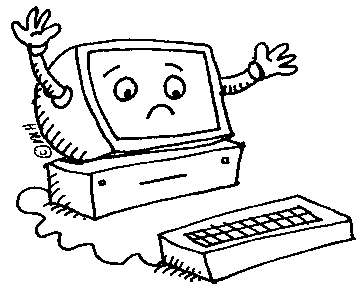

| Home · Title Page · Introduction · Physical Security · Cyber Security · Prevention · Biliography |

One of the first concern about computer security is hardware security. Without appropriate controls in place, computers can be stolen. It usually occurs in business office, school, airport when security is breached. According to the 2003 Computer Crime and Security survey perfomed jointly by the Computer Security Instititute and the FBI, notebook PC theft ranked number two among respondents for the most common types of attack or misuse. To prevent computer theft, we should secure the environment. Prevention measures help you to stop theft or burglars from stealing your computer. Civilian camera is a pretty good idea to observe any suspected activities access in public building office.
When we open the computer case, we can see many sensitive electronic devices and delicate components that can be easily damaged. A massive power outage affected the Northeastern USA and Southeastern Canada on Thursday August 14th 2003. 21 power stations were reported to be shut down within 3 minutes causing power cuts in many wide areas. Flood, hurricane, tornado, fire can also cause a physical damage to a computer system. The power outage has a great impact in business. Hackers can take an advantage of this to get in someone's computer system to steal database, records.
Besides all above reasons of hardware security concern, the unauthorized access is brought to attention. Maintaining access control means not only that users can access only those resources and services to which they are entitled, but also that they are not denied resources that they legitimately can expect to access.We should make regular computer security "To Do" items on each month. This will remind yourself or employees when to update virus software, backup data, check for software patches, and change passwords.
Computer Abuse Amendments Act of 1994 which prohibits unauthorized, intentional access to federal interest computers. "The 1994 Act changes coverage from acts committed on federal interest computers and affecting such computers to acts committed on computers used in interstate commerce or communications and affecting any computer.(35) Second, the threshold requirement of "unauthorized access" has been removed.(36) As a result, the class of those potentially liable has been expanded to include, among others, company insiders and users of computer networks who were arguably immune under the 1986 Act because their access was authorized.(37) Finally, the 1994 Act criminalizes certain types of reckless conduct in addition to intentional acts.(38) This may facilitate prosecution of hackers who cause the transmission of malevolent software, such as computer viruses, if such actions are sufficiently reckless but would not have been considered intentional under the 1986 Act.(39)
Finally, [sections] 1030(a)(6) prohibits: "knowingly," and with intent to defraud, trafficking in passwords which either would permit unauthorized access to a government computer, or affect interstate or foreign commerce.(40) "